If you're thinking about launching a website, these were likely the first two providers to pop into your head. In light of that, we're here to outline Wix vs WordPress so you can see exactly what these two giants can do for you.
So, read on for a comprehensive review of both services. Wix vs WordPress! Which will it be for you?
What's a Website Builder?
If you’re new to all things web design, you'd be forgiven for thinking the process of building a website was somewhat elusive and complex. This couldn't be further from the truth.
With the help of a website builder, you'll need next-to-no programming or design skills. So, this begs the question; what's a website builder, and what can it do for you?
Back in the good old days, creating a website was no easy task. You needed to know how to write HTML and CSS code, perhaps even some JavaScript, to make a site perform and look as you intended it to.
Each line of text, each box, and the image would need to be placed by numerically indicating the padding and margins between each element. Sounds complicated, right?
Luckily nowadays, there are several website builders and content management systems available to us.
These services provide user-friendly and visual interfaces for you to create a website. Often, you start with an existing ‘theme.' This assures a cohesive design across the entirety of your website. From there, you can then add your own content to the template by altering the text, adding images, etc.
Some website builders still allow you to edit the HTML and CSS code via the backend of their program. Needless to say, you'll have to do this manually. This is great for entrepreneurs who want more control over the design and functionality of their website.
While other website builders are entirely based on a drag and drop system, this sort of web page editor lets you grab an element you like and place it somewhere on the page.
With most website builders, you can be up and running within an hour. Free plans are often accompanied by banner advertising on your website promoting your chosen software, fewer features, and limited storage space. This is why most entrepreneurs eventually upgrade from the free plan to one of their website builder's premium packages.
Now we know what a website builder can do for you, let’s dive into the nitty-gritty of this review: Wix vs WordPress.
Wix
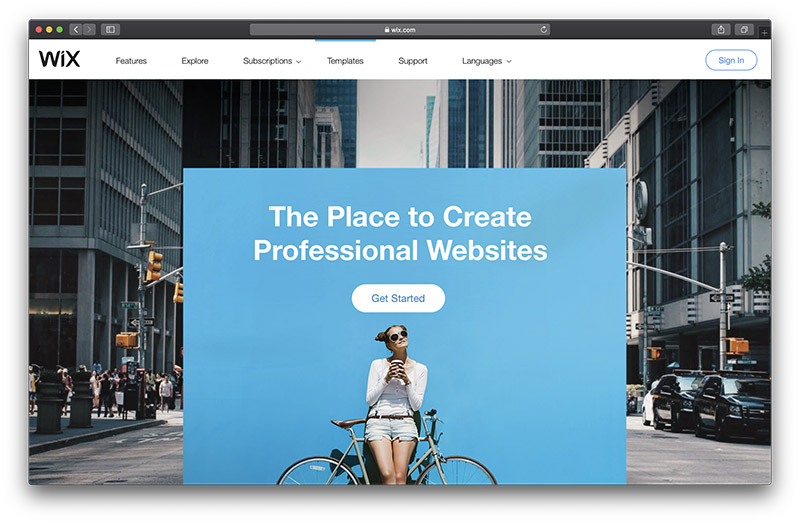
Wix was created in 2006, as one of the earliest and most successful follow-ups to WordPress. Wix has become famous through its advertisement campaigns, and its name's often dropped by big-time content creators who use this platform to fuel their site.
The website builder prides itself on its easy-to-use drag and drop interface. This gives you plenty of freedom to customize a design to complement your artistic tastes. With over 150 million users worldwide, Wix is a market-leading and well-recognized kit for building websites.
Below you’ll find the different premium plans and what you can expect from them.
Wix Pricing
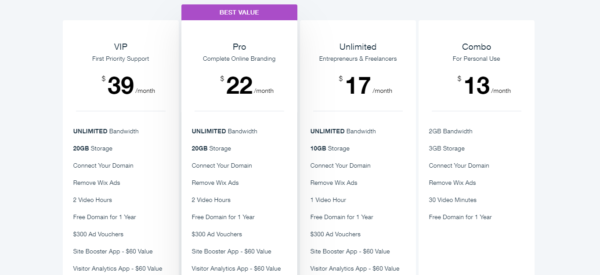
The Free Plan ($0)
If you opt for Wix's free package, this what you'll get:
- Wix website ads and favicon plastered all over your site
- Your website URL displayed on a Wix subdomain.
- 500 MB of storage
- A choice of over 400 templates
- Complete design functionality
The Combo Plan ($13 a month)
This package is intended for personal use.
- 2 GB worth of bandwidth
- 3 GB worth of storage
- You can connect and use your own web domain
- None of Wix's ads on your site
- 30 video minutes
- A free web domain for one year (this comes in handy if you don't already have one)
The Unlimited Plan ($17 a month)
This is best for freelancers and entrepreneurs.
- Unlimited bandwidth
- 10 GB worth of storage
- One video hour
- $300 ad vouchers
- Access to the Site Booster and Visitor Analytics Apps
The Pro Plan ($22 a month)
Everything in the previous plans, plus:
- 20 GB of storage
- Two video hours
- A professional logo
- Social media logo files
- An events calendar
The VIP Plan ($39 a month)
This is Wix‘s most expensive website package. Needless to say, you'll get all the features in the above plans as well as priority response and VIP support from Wix's customer care team.
Wix also offers several premium plans that are created explicitly with ecommerce and business in mind. These plans are all commission-free and allow users to accept online payments. As they're all higher-tier payment plans, they all include unlimited bandwidth, the option of connecting your own web domain, none of Wix's ads, as well as access to Google Analytics and ad vouchers.
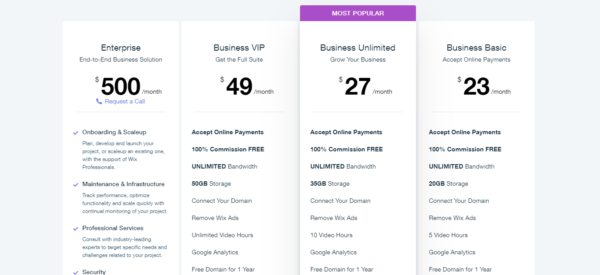
Here are the key differences:
Business Basics ($23 a month)
- 20 GB storage
- Five video Hours
Business Unlimited ($27 a month)
- 35 GB storage
- Ten video hours
- Social media logo files
- A professional Logo
Business VIP ($49 a month)
- 50 GB storage
- Unlimited video hours
- Priority response
- VIP support
Enterprise ($500 a month)
This is what Wix call their ‘end-to-end business solution,' and it provides you with the following:
- The benefits of planning, developing, and launching your project (or scaling an existing one) with the advice of the pros at Wix.
- It's easy to track, optimize, and scale your business because your project is monitored continually
- You can safeguard your site with Wix's yearly security audits and sophisticated web protection features.
- You can communicate directly with a dedicated expert
Wix Pros 👍
- Even on the cheapest plans, Wix gives you access to hundreds of themes that can be easily customized and altered. These themes are categorized into portfolios, blogs, personal websites, etc., so you can quickly find the right professional look for your website.
- The interface is easy to use thanks to its full drag and drop editor. Creating a website doesn’t take long, and no coding skills are required to use any of Wix's features.
- Wix has an app store that lets you easily integrate plugins into your site.
- Wix has a blog feature with an easy-to-use editor.
- Wix walks you through ways to improve your SEO and allows you to quickly name all your files and images to enhance your ranking.
- Ecommerce functionality is already built-in with the Business and Ecommerce premium plans.
Wix Cons 👎
- Customization beyond the drag and drop design features is limited. So, more sophisticated features may be missing.
- Simplistic templates are hard to customize (in-depth).
- A lack of blogging features (beyond posts and categories). The blog post editor is also less advanced, with fewer options for modifying the layout.
- Wix allows you to edit the mobile view of your website separately. But, the success of this depends partly on the theme you've chosen. Namely, because without full customizability options or access to the code, it's challenging to achieve the perfect look on mobile.
Who Should Use Wix?
Wix is a great website builder for anyone who cares for a plentiful choice of easy-to-customize and professional template designs. It's user-friendly, which makes it quick and intuitive to use. All in all, it's a good call for beginners and anyone wanting to avoid the programming side of things.
Its built-in ecommerce features on the higher-tier plans are also great for small brick and mortar businesses who want to start selling online.
WordPress
WordPress is the most famous and undoubtedly the most powerful blogging and content management system on the internet. Not only is it used to power 33% of sites on the web, but you'll also no doubt recognize many of its users; The Obama Foundation, The City University of New York, Canada.com — just to name a few!
It was released 16 years ago, so it's had plenty of time to gain experience and traction. So, if you’re serious about creating a website and committed to building a professional brand, there's absolutely no doubt that WordPress is an excellent choice (providing you use it correctly). The features and options available are virtually endless.
Many years ago, WordPress was primarily a tool for creating blogs. But since then, it's advanced to becoming one of the go-to options for businesses, ecommerce, portfolios, and much, much more.
It’s worth clarifying; there are two different WordPress services:
1. WordPress.org
This is an open-source content management system, so it's entirely free to use, and its code's accessible for anyone to work on. This service allows for full customization as you can dive right in and alter the PHP code.
Consequently, WordPress’ full power unfolds to those with a bit of programming know-how. With some experience in web design and coding, this version of WordPress can be used without limitations.
2. WordPress.com
On the other hand, WordPress.com is a website builder that more easily compares to Wix. But, on the lower tier plans, you don’t enjoy the same level of customizability that the open-source software offers. You don’t, however, need any programming knowledge to create a website using WordPress.com.
With their paid plans, this service provides you with web hosting and a whole array of features. So, if you're a beginner, you don't have to waste your time and energy learning how to code.
💡 You should note: As WordPress.com is the service more similar to what Wix provides, this is what we'll focus on in this article.
WordPress Pricing
WordPress.com has several different pricing plans. Put simply, the more you pay, the greater number features you get – which, when you think about it, makes sense.
However, there's a free plan you can get started with, which might be more than enough if you’re just dangling your toe in the water and testing your content.
But, if you’re looking to create a more professional appearance, it's worth getting (at least) their cheapest paid-for plan. This removes WordPress' ads from your site, which goes a long way for boosting the credibility of your brand.
All of WordPress' programs are more affordable if you opt for yearly billing. So we've listed the monthly costs for the annual payment plans below:
The Free Plan ($0)
The free WordPress plan is an excellent starting point for testing the waters and personal blogging. With this package you'll get:
- Dozens of free themes
- Includes essential website-building functionality
- 3 GB of storage space
- WordPress ads on your site
The Personal Plan ($4)
This package increases your storage allowance to 6 GB and removes WordPress‘ ads. It's best for either a simple blog or a personal website. You get the same access to the themes on the free plan, a free domain for one year, and access to email and live chat support.
The Premium Plan ($8)
This plan adds marketing and monetization tools into the mix. This comes in handy for anyone taking the monetization of their site seriously. With this package you get:
- Unlimited access to premium themes
- Advanced design customization
- A Google Analytics integration
- Advanced social media tools
- 13 GB storage
- Site monetization
The Business Plan ($25)
This comes with everything we've already listed, but you'll also get:
- SEO tools
- The option of installing plugins
- Personalized help
- You can upload themes
- 2000 GB storage
- The complete removal of WordPress' branding
The Ecommerce Plan ($45)
Last but not least, there's WordPress‘ Ecommerce plan, their most extensive bundle. For $45 / month this plan permits you to:
- Sell unlimited products or services
- Accept payment from over 60 different countries
- Ecommerce marketing tools
- Integrations with top shipping carriers
WordPress Pros 👍
- WordPress is a very customizable and powerful website builder, especially if you have programming knowledge. The sky's the limit; virtually anything is possible with WordPress.
- WordPress provides thousands of themes to choose from and a massive variety of plugins to increase the overall functionality of your site
- The Personal and Premium plans are very affordable with stable hosting and excellent optimization, especially for blogs.
WordPress Cons 👎
- If you don’t know your way around a bit of code or don’t want to follow instructions and tutorials, you might occasionally run into problems that are difficult for you to fix. To fully use WordPress‘s powerful system, a bit of programming know-how is required. As such, it's not quite as easy to use as its competitor Wix.
- While there are options for SEO, these are limited. WordPress users might want to install a plugin to handle their SEO needs better. Most WordPress users report that Yoast is an excellent option.
- If you require more storage, you'll quickly find WordPress to be a pricier option than some of its competitors.
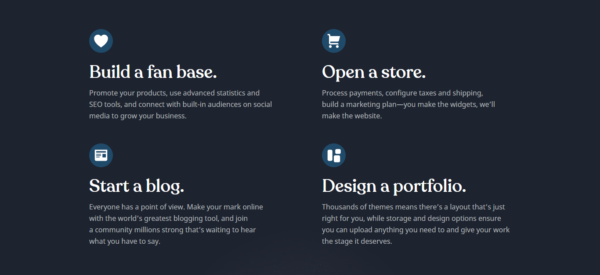
When's WordPress the Right Choice?
If you have some coding knowledge already or aren’t afraid to learn and follow tutorials, WordPress is an excellent choice for you. With its high degree of customizability and it's vast library of plugins, you're sure to be able to bring your dream website to life.
It almost goes without saying, WordPress.com is also a brilliant option if you're a business with an in-house web designer. You simply won’t find another CMS more popular back end programmers. Period.
WordPress.com is also the right option if you’re focused on blogging and want more functionality out of your blog. Again, this requires a bit of know-how. Still, in comparison to its competitors, WordPress (usually) allows for more customization and layout options in each of your blog posts. That's as well as other features like categorizations, RSS, and tags.
If you're entirely new to building websites, don’t want to spend too much on your online presence, or simply want an easy-to-use program to throw up a good-looking page, WordPress might be too advanced for your needs and cost more time and effort than necessary.
Wix vs WordPress: The Core Differences Summarized
Both Wix and WordPress have a lot of value to offer as powerful website builders.
With each option, you can unlock important features, like themes to customize your site, the power to choose your own domain name and more. With WordPress, you get things like a diverse app market to explore, excellent services for the search engines, and even access to tools like WooCommerce.
With Wix, there are benefits like excellent simplicity and performance to consider. Wix makes it easy to unlock powerful features, without spending a fortune.
Okay, let's delve a little deeper into the Wix vs WordPress comparison.
Wix vs WordPress: Pricing and Scalability
The good news for beginners in the business building environment, is that both WordPress and Wix are very affordable. With so many WordPress themes to choose from for free, and various no-cost apps, you can build a WordPress website with little initial expense.
WordPress offers more storage at a lower price, but jumps straight into their pricier options if you require much more space. The premium plans scale up to as much as 200 GB worth of storage, whereas, Wix caps its storage space at 50 GB.
While this is plenty for the majority of website owners, WordPress can facilitate enterprises of any size. Also, in comparison to Wix, WordPress is known to be a more stable choice for bigger sites.
Overall, Wix’s premium plans are cheaper than WordPress’, but depending on the size of your site and business, the extra cost of a limitless WordPress site might be worth the price tag.
But, if space isn't an issue, Wix is more generous with what you get in their cheaper plans. They provide access to their full design functionality and a higher number of themes to choose from, from the get-go.
It’s also worth noting that Wix has a wider range of plans to choose from. There are seven different pricing plans available, each with more features to offer depending on how much you’re willing to spend. For things like the Unlimited, Pro, eCommerce, and VIP plans, Wix even gives you some excellent free gifts, like a domain name free for one year, and $300 in ad vouchers.
WordPress is a little more complicated from a pricing perspective. You need to pay for your own hosting service on the free plan, which means that much of the cost you’ll pay for your site is based on who you choose to work with. Your costs can also differ depending on whether you want to use a premium or free theme, and whether you need to work with a developer on functionality.
Depending on what kind of added extras you need, WordPress can become more expensive.
Wix vs WordPress: Customizability
WordPress is well-known as one of the more flexible website builders on the market, perfect for companies that want to create something unique.
WordPress is hands down the more customizable of the two. It allows you to make changes under the hood that Wix doesn’t provide any access to. As a result, with the right knowledge, you can achieve pretty much anything you want with WordPress.
WordPress prides itself on providing a flexible environment where developers and non-developers alike can create a site or online store that’s suitable to them. Although you can accomplish a lot with a Wix site, WordPress has everything from small business analytics tools to ecommerce plugins to help your business seem more unique.
If you’re comfortable with coding, then you can make massive changes to WordPress themes. If you’re not, you might need to pay a little extra for a developer to help you put your mark on your website. WordPress does have a wide selection of free templates to choose from. However, your customization options will be less if you choose WordPress.com over WordPress.org.
It's also worth noting that not all of the pre-built themes available for WordPress are as great as they should be. There are some less professional options out there. You can’t always trust what other designers and developers have put together.
That being said, Wix is by no means limiting. With over 400 different and stylish themes available, it's safe to say; you have plenty of options. Not to mention, their drag and drop system, while not without its limitations, makes customization a lot easier.
One of the best things about Wix for design and customization purposes, is that many of the themes and templates come pre-populated with example content. That means that you can get a better idea of what your site is going to look like before you begin building.
If you’re unlikely to use the advanced and more technical options WordPress provides, Wix's drag and drop interface makes customization much easier overall. It provides plenty of opportunities to change the design, so don't worry too much about that.
Another convenient feature to consider with Wix is that all of the templates available come with built-in features that help you to make the most out of your site for a specific industry. You can sort through themes and templates according to your industry and find options made for you.
For instance, if you looked for a restaurant theme with Wix, it would usually come with things like booking and order forms included. You can achieve the same functionality with WordPress, but you need to use plugins. If you want to access the code of the Wix templates, then you need to use Wix ADI. This is a design-focused tool that lets you create a website with ease.
While both WordPress and Wix have a lot of value to offer in this regard, many people agree that WordPress just has a lot more options for design and customization. However, it’s Wix that makes customizing your website easier.
Wix vs WordPress: Ease of Use
There’s more to choosing the ultimate website builder for your small business than finding something with plenty of features. Sure, you want to know that you can access the same contact forms and add-ons that you can get with tools like Squarespace and Shopify. However, you also need to feel comfortable with the functionality of your new site.
Wix wins when it comes to ease of use. Their drag and drop functionality requires little to no explanation.
Whereas, WordPress requires a bit of technical know-how to fix whatever's gone wrong.
An inexperienced designer might run into an issue and be stuck. This forces them to look into tutorials and teach themselves a broader toolset to overcome the problem. WordPress has a much steeper learning curve and, while rewarding, might not be worth studying if your only objective is producing a simple, elegant, and functional website.
No matter where you go on the internet, you’ll find countless reviews claiming that Wix is one of the easiest website builders on the market. You don’t need to install any software, and you don’t have to track down your own hosting provider either. The Wix app market even means that you can add features in no more than one click.
With Wix as your website builder, you can set everything up in a matter of minutes. The editor is totally drag-and-drop and it’s very intuitive – even if you’re a total beginner.
On the other hand, WordPress is best-known for it’s customization features and wide selection of plugin and add-on options. Unfortunately, these tools aren’t always simple to implement and install. The software does require at least a basic knowledge of coding, and the ability to follow some tutorials. When things do go wrong with WordPress, it can be a lot harder to fix things.
Although many people get used to WordPress and find that it becomes easier to use over time, Wix is the tool that generates the best results for beginners.
Plugins, Blogs, and Ecommerce
Most of the leading website builders on the web today come with a lot of features and customization options already built-in. However, as the digital world continues to evolve, it helps to know that you can tweak and update your WordPress or Wix editor.
WordPress, with its open-source software base, provides access to thousands of plugins created by users all over the world. As a result, users are spoilt for choice and bound to find what they need to extend the functionality of their site.
WordPress plugins and addons come in a wide variety of shapes and flavors. You can add Facebook feeds to your website or add a store section to your social media page. There are even tools that help you to improve your SEO ranking and make more sales through Google.
As an open-source platform, WordPress has coding that’s available for anyone to open up and use. That means that any programmer can get involved with the WordPress site and create their own plugins and themes for others to use.
The flexibility of WordPress is why the site builder has evolved at such a rapid pace. It’s also one of the reasons why WordPress accounts for most of the websites on the internet today. There are more than 60 thousand WordPress plugins on the web.
The drawback to this is that some plugins might not work as intended as they're not quality controlled by WordPress itself, so without technical know-how, it might be challenging to make some of these apps work.
Wix has much less choice when it comes to plug-ins, but they're all tried and tested. The trade-off is variety and potentially endless functionality versus basic but certain functionality. As you can see, it's swings and roundabouts.
Just because WordPress has all of the plugins you can imagine (and then some), doesn’t mean that it’s the best choice, however. The plugins that you get for WordPress online could be incredible, or they could be terrible. The same can’t be said for Wix.com.
Wix isn’t an open-source environment. That means that no-one can just go and develop anything they like for Wix. The only people who have access to the code are official Wix developers. Most of the popular plugins and add-ons for Wix are already built into the software, and they have a far smaller chance of being buggy.
Whether you’re looking for a membership tool, or something for your ecommerce sites, Wix has a much more trustworthy environment. Plus, you’ll be more likely to get some customer support from the Wix team if something goes wrong with a plugin. On the other hand, with WordPress, you would need to figure things out on your own.
Ecommerce and Selling Online
Being able to build a powerful website with a great blog is fine. But what if you want to take your site to the next level with some selling opportunities too?
That’s where ecommerce tech comes in. There’s a big difference between having a WordPress blog, with a hosting company like Bluehost that delivers blogs to your fans, and a fully functioning store. While Wix SEO might not be as strong as WordPress SEO, Wix does have the benefit of eCommerce built-in.
Wix ecommerce sites are pre-designed for online selling. You do need to sign up for one of Wix’s dedicated plans for eCommerce, but everything you need to sell online should already be working for you. Having a site with selling features already built-in can be extremely helpful.
Of course, that doesn’t mean that you can’t develop an online store with WordPress. In fact, WordPress offers access to one of the world’s favorite eCommerce tools: WooCommerce.
WooCommerce is a free-to-install plugin that allows you to make transactions online. There are some other fees to think about, like transaction fees. However, usually, these fees are quite affordable. You won’t spend more than you would on options like Shopify.
Plus, with WordPress and WooCommerce, you get an excellent combination. With the Gutenberg editor to help you develop your content, SEO features, and more, you can boost the chances of people finding your eCommerce sites. Plus, you get extra tools like redirects to experiment with too.
The WooCommerce plugin is a lot more advanced than the built-in ecommerce tools from Wix. However, it is another thing that you need to spend time learning how to use properly before you can make the most of WordPress.
Blogging and Content Marketing
Part of the reason that we think WordPress might be better for ecommerce business owners than Wix, is that it combines things like content marketing and SEO with sales opportunities. It’s probably no surprise then, that we consider the WordPress features for blogging to be a lot better than what Wix can offer.
Wix and WordPress both offer plenty of support for companies that want to build their own blogs. On Wix, you can design your own articles, arrange them into categories, and even use tags. There’s also the option to add apps to your content that allow you to assign contributing authors to content.
We like the fact that Wix has the option to blog from a mobile device. However, there isn’t a great commenting functionality available, which makes it harder to get feedback from your audience. Instead, you need to use Facebook comments, which looks a bit awkward.
WordPress is a different ball game. You get all of the same blogging features you would have from Wix with WordPress. The biggest difference is that there are also some extra benefits too, like the option to place an image on the top of your blog posts, and the option to backdate content.
Probably the biggest downside of WordPress for blogging is that unlike Wix, there’s no library available that allows you to immediately drop free-to-use content into your post from around the web. You can always source your own pictures, however.
Search Engine Optimization Tools
Blogging and SEO features often go hand-in-hand. However, we thought it was worth giving SEO it’s own attention in this comparison.
As you may already know, Search Engine Optimization is all about making careful changes to the back-end and content of your website, so you have a better chance of ranking on the search result pages. Everything from keywords to backlinks will influence your search engine rankings.
The better your SEO is, the easier it will be to attract buyers to your store, or customers to your blog. Yoast is the number one SEO plugin for WordPress on the market today, and it’s one of the key factors making WordPress so valuable for SEO purposes.
Yoast is the number one WordPress plugin, and it costs $69 to use for one WordPress website. With this tool, you can edit meta-data, adjust internal linking suggestions, manage redirects, and handle a lot of other factors that might influence your search engine strategy.
So, does that automatically make WordPress better than Wix? Well, to be fair, Wix does have a few of its own brilliant SEO tools to offer. You can even get solutions like Site Booster for free if you sign up to the Unlimited plan.
Site Booster comes with a ton of cool SEO features, such as the ability to embed your company’s address in your search results and target specific keywords. However, many business owners do prefer Yoast overall, simple because it has more functionality.
Wix vs WordPress: Help and Support
So, when you need some extra assistance bringing your company’s new site to life, is Wix or WordPress a better fit?
First of all, WordPress has a brilliant community of users, and a wide selection of resources and tutorials to help you master your site building solution. Some hosting plans even come with support in the form of WYSIWYG editors.
However, just like with plugins for your ecommerce store from WordPress, it’s often difficult to separate the great from the not-so great. You could always think about working with a professional to get your site set up initially. However, this strategy can be quite expensive.
On the other hand, Wix has a committed support team to ensure that users can get assistance if they need to troubleshoot their website or fix common issues. There’s also a wide range of help articles and videos to explore too. On top of that, you can check out forums for community answers.
Wix also provides scheduled phone calls and email support for those who need it. Wix’s help center is concise and easy to use. The presence of a genuine support team means that you can save some much-needed time on fixing your website. Overall, WordPress and it’s DIY approach is a little tougher to get the hang of.
Wix vs WordPress Security
Finally, let’s think about the security of both WordPress and Wix. First of all, Wix is a hosted solution. That means that the responsibility for keeping your website safe lies with the company that you’re buying your hosting from. Wix needs to make sure that the platform you use remains secure and safe. You should also be able to rely on things like backup and hacking protection.
On the other hand, if you build a website with WordPress, and you’re not working with a developer, you’re going to be responsible for your own security. You need to ensure that your version of the website builder is up-to-date and patched. You also need to keep on top of the security of any themes and plugins that you’re using.
If you don’t properly handle your site maintenance, you could have a serious problem. On top of all that, it’s worth remembering that some of the plugins and themes from WordPress can come with dangerous code which harm the security of your website. This ensures that you need to be even more cautious about the tools that you use.
WordPress also requires users to backup their own website. Although there are plugins to help you automate this process, WordPress demands a lot more insight and activity than Wix. All the while, Wix is often less vulnerable than self-built WordPress sites, because there’s less scope for users to add messy code to their own website.
If something does go wrong with your website, Wix’s support team will be on hand to help you resolve the issue. Another bonus about Wix is that you get an SSL certificate with all websites. Although you can get your own SSL certificate for your WordPress site, that’s not always as simple as it should be.
Wix vs WordPress: Which is the Best Ecommerce Website Builder?
For smaller businesses, Wix‘s features are usually sufficient for selling both e-commerce and digital products. However, larger companies might benefit from a platform like WordPress, which is more tailored to their needs and easier to scale. WordPress simply allows for more options thanks to the thousands of plugins on offer and the fact its open-source software.
As a blogging platform, WordPress takes center stage. Namely, because it's explicitly designed for bloggers. It's not as easy to use but will allow full-time bloggers to customize their content and categorize it efficiently. Wix’s inbuilt blog is lacking some of that functionality, but will likely be entirely sufficient for hobby bloggers who just want to add a bit of content to their sites.
In Summary…
- WordPress has a steeper learning curve and is harder to use than Wix.
- Wix requires no coding knowledge whatsoever and boasts an easy-to-use drag and drop system, whereas a complete beginner may fall into some technical limitations with WordPress.
- WordPress, if used with skill and experience, can be customized without limitation.
- Wix offers a greater number of themes and designs to start off with
- WordPress relies on plugins for added functionality like SEO or ecommerce. Alternatively, you can custom-tailor these things (if you know how). Whereas, Wix offers more basic but easy-to-use inbuilt options for these kinds of functionalities.
- WordPress is pricier for the upper-tier plans but more scalable for larger businesses. It's stabler for high-bandwidth sites and allows for much more storage.
Wix vs WordPress: Are You Ready to Take Your Pick?
Both WordPress and Wix are giants in the website builder industry for a good reason. You won’t go wrong with either of them. With the comparison above, perhaps you'll now have an easier time figuring out which one better suits your needs. We’d love to hear which one you prefer — Wix vs WordPress which is your choice? Let us know in the comments below!
Featured image credits: Shutterstock

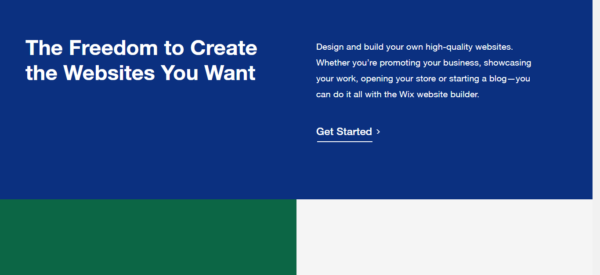
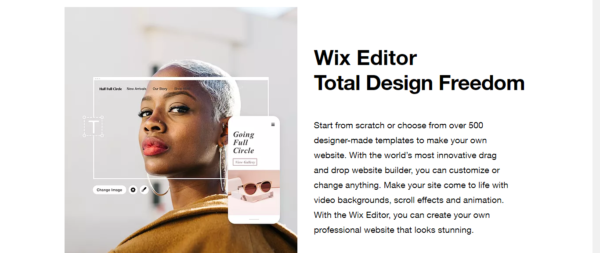
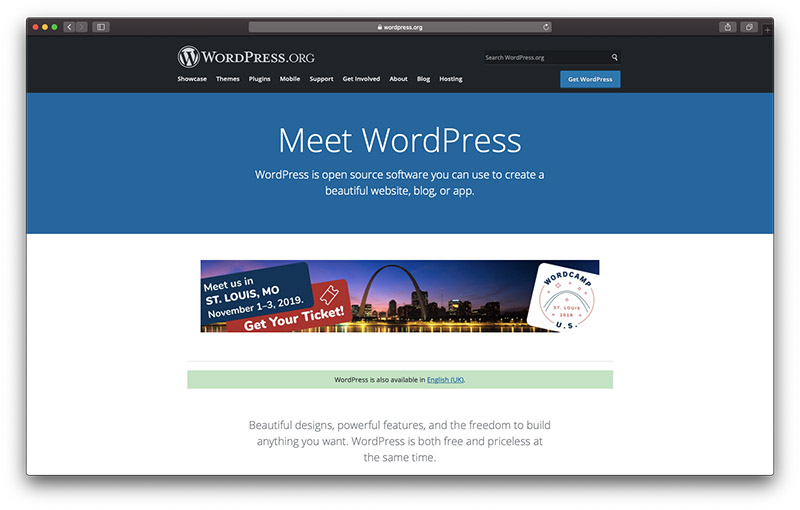
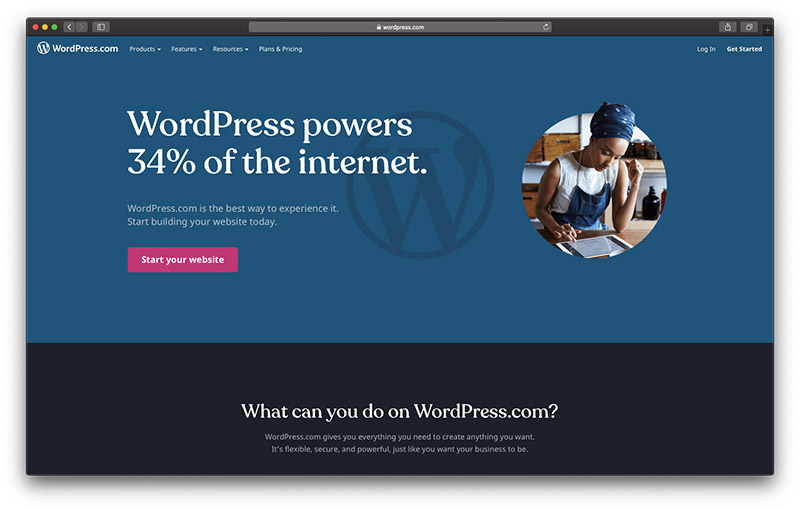
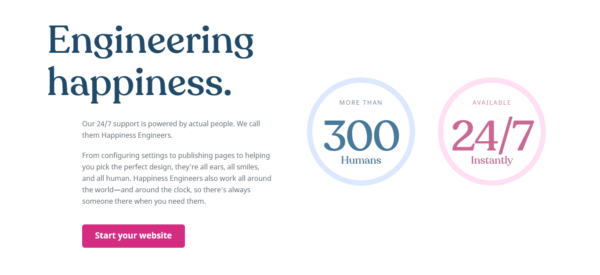



Hi, I’ve always admired WIX. All the images of my site were indexed on Google and my site was up in search. After installing ECWID, my URL got messed up and all the images from my website got de-indexed from Google. Everything looks okay on Search Console though. WIX says that there are no issues from their side. I’m just wondering how come the entire visual content from my website got vanished overnight?
Hello Joquim, you should get in touch with an SEO expert and look into this.